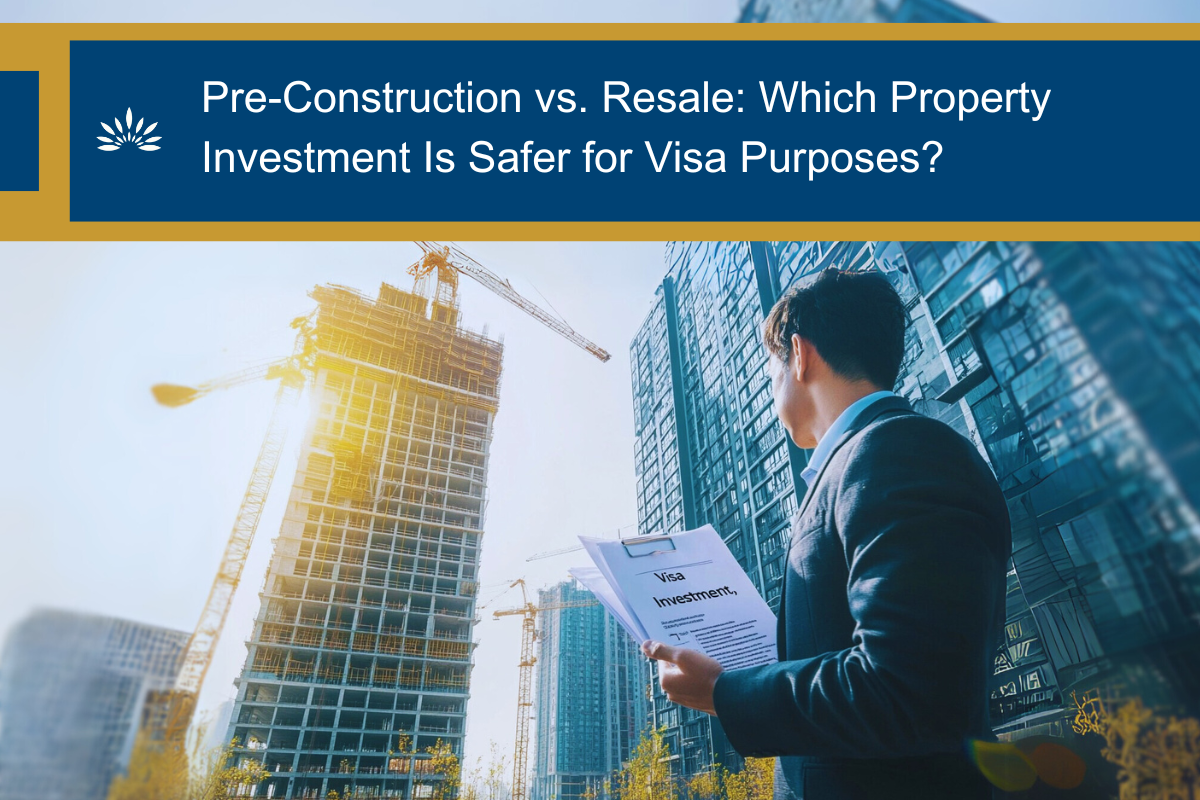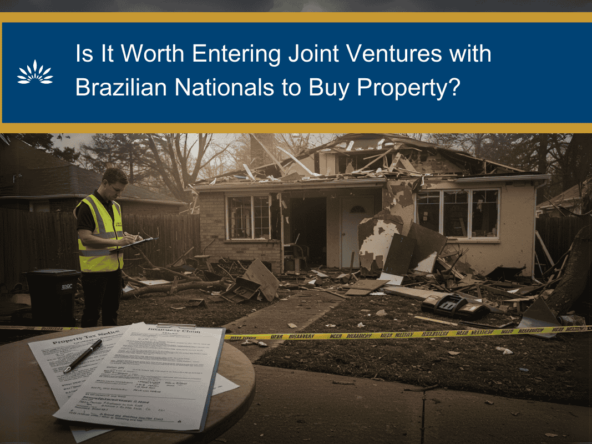Pre-Construction vs. Resale for Visa Purposes: Making the Right Investment Decision
Are you torn between a brand-new development or a ready-to-live-in property to secure your visa? This article breaks down everything you need to know about both routes—pre-construction and resale—so you can invest wisely and fast-track your immigration goals. Keep reading to discover how to make the most of your real estate purchase while staying compliant with visa requirements.
Pre-Construction vs. Resale: Which Property Investment Is Safer for Visa Purposes?
Imagine you’re sitting at a cozy brunch spot in São Paulo with your friends John and Sarah. Between bites of pão de queijo, you all discuss your dreams of moving abroad—somewhere that offers a fresh start and exciting life changes. John can’t stop talking about a sleek, pre-construction condo he’s considering in a fast-growing urban area. Sarah, however, leans toward a resale real estate option so she can finalize her real estate purchase more quickly. Both want to invest in property so they can qualify for an investor visa, but they’re split on whether a brand-new build or an existing property is best for their visa application process.
John loves the potential appreciation of a modern unit in a rising neighborhood, while Sarah values the stability and immediate certainty of stepping into a physical space. At the heart of their debate is one question: Which route—pre-construction or resale—is the safer bet for immigration purposes, and how does each option impact your ability to secure a visa?

In this comprehensive guide, we’ll explore exactly that. We’ll discuss how either strategy can work within a property investment program, explain the key differences in timelines, highlight which documents you need, and show you how to protect your real estate investment. By the end, you’ll see how to align your real estate needs—whether in Brazil, Europe, or the Middle East—with your real estate investment goals of gaining foreign residency or citizenship. Along the way, we’ll link you to top resources such as lawyers for legal clarity and real estate brokers who know the market inside and out. Let’s dive in.
Introduction to Visa-Focused Property Purchases
Why Property Investment Is Tied to Immigration
Countries around the world offer various residency or citizenship-by-investment programs. Often, these programs revolve around real estate because governments benefit from inflows of capital, while investors gain potential returns and a new legal status. For instance, people interested in a real estate investment in Dubai might purchase an apartment in a high-rise building to qualify for local residency, while others might focus on property investment in the UK for a Tier 1 investor route (in markets and timeframes where that option is available).
Securing an investor visa typically requires meeting a minimum investment threshold, which can be satisfied by buying investment property above a certain value. The choice boils down to purchasing a pre-construction (often called “off-plan”) project or acquiring a resale real estate property. Both can serve your goal of expanding your real estate investment portfolio while opening the door to new visas. However, each path carries distinct advantages, timelines, and risks.
Understanding Your Real Estate Needs and Visa Application Process
Before you commit, you’ll want clarity on your real estate needs—are you primarily focused on a family home, rental income, or a capital appreciation play? Equally crucial is your visa application process timeline. Certain programs demand swift action so you can present your property deed quickly, while others allow you time to wait out a construction period. In short, there’s no one-size-fits-all answer; your decision hinges on the specifics of your life plan, risk tolerance, and immigration regulations.
Additional Insight: Cultural and Language Barriers
Beyond the visa-related considerations, it’s important to factor in cultural and language differences if you’re investing in a country you’re not familiar with. Communicating with developers, contractors, and local authorities becomes more complex if you don’t speak the local language fluently. For many international investors, hiring bilingual real estate professionals or working with a property management company can simplify the process significantly. This can be especially true in countries like Brazil, where Portuguese is the primary language, or in the UAE, where Arabic dominates official documents—though English is widely used in business.
What Is Pre-Construction and How Does It Work?
Pre-construction properties, also known as “off-plan” or “new builds,” are projects sold to investors before they’re completed—or sometimes even before builders break ground. Developers use the funds from early buyers to finance construction. In return, these investors often get a lower purchase price, potential customization options, and a chance at significant appreciation if the market grows during the building phase.
Financial Upside and Flexible Payment Plans
One of the major draws of pre-construction is cost. Early investors may lock in prices well below what the final units might list for upon completion. Developers often sweeten the deal with a scheduled payment plan, letting you put a fraction down initially and then pay in increments throughout construction. This can ease your financial burden if you’re juggling other obligations or if you want to distribute your capital over multiple properties in your real estate investment portfolio.
Furthermore, the possibility of customization is a key perk. You might pick certain finishes, floors, or interior layouts, effectively shaping the unit to your preferences. That can be invaluable if you’re planning to eventually live there yourself or if you want a high-end look for future renters.
Dive Deeper: Bridging Finance and Mortgage Structures for Pre-Construction
When it comes to financing a new build, some banks or financial institutions offer “construction mortgages” or bridging loans. These release funds in stages, tied to building milestones—for example, when the foundation is laid, when the structure is completed, and so on. This reduces risk for the lender, but you’ll need to ensure you meet each payment deadline. If delays occur, your financing approval might lapse, forcing you to reapply or renegotiate rates. For foreign investors, this can be doubly complex if local lending rules are strict about non-resident borrowing. Investigating these structures beforehand is essential to keep your visa application process on track and avoid financing pitfalls that could derail the entire purchase.
Risk of Delays and Developer Reliability
However, pre-construction is inherently riskier than buying a completed property. If the developer fails to secure enough funding, gets bogged down by permits, or faces supply-chain disruptions, the entire project could be delayed—or worse, canceled. For immigration purposes, these issues can spell trouble because your visa application process might hinge on presenting a finished property deed or proof of ownership by a set deadline.
That’s where it helps to have a strong team at your side, including a lawyer who understands property investment program guidelines and a reputable real estate broker who’s adept at vetting developer track records. Ensuring the contract contains penalty clauses for missed deadlines or the possibility of refunds can mitigate risk.
Additional Considerations: Construction Quality and Long-Term Value
It’s also important to assess the quality of the build itself. Sometimes, the marketing materials promise state-of-the-art amenities and finishes, but the reality might be different. Ask for samples of materials, visit other developments by the same builder, and request references from previous buyers. Construction quality affects not just your living experience but also the long-term value of your investment property. A well-constructed condo with modern, durable materials will likely attract higher rents or resale value, boosting your real estate investment goals over time.
Why Consider Resale Real Estate?
Resale real estate refers to properties already built and currently owned by someone else. Buying resale is often seen as more transparent because you can do a thorough inspection, gauge how the home has weathered the years, and even talk to neighbors about community issues. If your aim is to move quickly, you can typically finalize the deal—and present a property deed to immigration authorities—in a matter of weeks or months, a major plus for those chasing a strict visa deadline.
Immediate Ownership and Neighborhood Stability
One big advantage is the immediate shift to ownership. The house (or condo) is ready to occupy, so if your investor visa regulations demand swift occupancy or management of the property, a resale real estate purchase could be perfect. You don’t have to wait for the building to be finished, nor do you risk losing your reservation deposit if the developer hits financial trouble.
Resale properties are also situated in established neighborhoods. This allows you to check historical price trends, explore local amenities, and estimate rental income with more accuracy. If you’re hoping for near-term rental returns or a stable environment for your family, buying an investment property that’s already built often gives you better data to work with upfront.
Renovations, Upgrades, and Hidden Costs
Despite the transparency advantage, older homes can come with hidden issues or the need for upgrades. You might need to replace an aging roof, update wiring to modern standards, or invest in energy-efficient windows. While you have the benefit of conducting inspections prior to purchase, these additional costs can add up, sometimes offsetting the savings of buying an older home. That said, if you plan strategically—perhaps completing renovations in stages—these improvements can also increase the resale value and potentially speed up your path to meeting visa application process requirements for permanent or extended residency.
Visa-Specific Considerations and Timelines
Aligning Your Real Estate Purchase with a Visa Application Process
When evaluating pre-construction vs. resale real estate specifically for immigration benefits, you need to factor in the visa application process timeline. Many programs require you to present proof of property ownership (a property deed) within a given timeframe. Delays in construction or unexpected hurdles with local authorities can jeopardize your entire investor visa strategy.
For instance, imagine you’re eyeing a real estate investment in Dubai. Dubai often incentivizes foreign investors with residency permits if they purchase properties meeting certain value thresholds. If your building won’t be complete for another two years, you may not fulfill the residency requirement by your personal deadline—especially if you need to relocate sooner for work or family reasons.
Document Requirements for Each Path
Pre-Construction: Requires a contract that outlines your rights to the future property, proof of payments or escrow, and updates on construction status. The immigration office may want to see developer details and confirm that the project isn’t fraudulent.
Resale: Typically involves presenting a finalized property deed, inspection reports, and proof of funds. Once you have the deed, it’s straightforward to prove legal ownership, which is often a key factor in your application.
Each country defines “ownership” differently. Some programs might accept a binding contract on a new build, while others demand the final deed or official registry. Always consult with real estate professionals and an immigration attorney to confirm local definitions.
Additional Focus: The Role of Residency Requirements
Some countries require you to physically reside in the property for a certain number of days each year to maintain your investor visa. This can be simpler with a resale home that’s immediately livable. If you have to wait two years for a pre-construction unit to be move-in ready, it may complicate your ability to meet these residency requirements. For those with families or job obligations in other countries, ensuring the timeline for occupancy aligns with visa stipulations is essential.
Detailed Comparison: Pre-Construction vs. Resale
To simplify your decision, here’s a side-by-side table comparing the two paths. Keep in mind that specific outcomes can vary based on individual markets and developer reputations. However, this table offers a general glimpse into the main factors that might influence your real estate investment goals and immigration plans.
| Factor | Pre-Construction | Resale Real Estate |
|---|---|---|
| Timeline | Potentially long wait until completion. Delays can negatively impact your visa application process if your property deed isn’t issued in time. | Faster to finalize. Immediate or quick move-in, aiding a smooth transition for investor visa requirements that demand rapid proof of ownership. |
| Financial Structure | Typically involves scheduled payments or installments throughout construction, helping distribute costs. | Requires a lump sum or mortgage approval at closing. Fewer payment phases, but might need more capital upfront. |
| Customization | You may tailor certain elements of the design if you buy early, adding a personal touch to your real estate purchase. | Minimal customization unless you renovate after you buy—potentially more costly than customizing during construction. |
| Risk Profile | Higher risk if developer defaults or if the market declines before completion. Construction delays can jeopardize your application in a property investment program. | Generally lower risk because you can inspect and confirm the property’s condition beforehand. The neighborhood’s appeal and resale value can be assessed through historical data. |
| Documents for Visa | Contract of sale, construction updates, proof of installments. Some visa programs may not accept incomplete properties as valid for final immigration documentation. | A property deed and sale agreement. Easier to prove legal ownership, aligning more efficiently with many investor visa rules. |
| Market Appreciation | Potentially higher appreciation if bought in an emerging area, but you carry the uncertainty of how the final product and area will develop. | More predictable growth, especially in established neighborhoods. Historical price data provides a clearer picture of potential gains. |
| Immediate Rental Potential | None until the building is completed. This could delay rental income intended to offset mortgage costs or finance your lifestyle. | Immediate opportunity to rent out the unit. Beneficial if part of your real estate investment goals involves securing a steady rental yield right away. |
| Neighborhood Assessment | Buying into the future promise of an up-and-coming area, which can be lucrative if the area booms. More guesswork required. | More certainty about local infrastructure, schools, transportation, and general desirability. Allows you to make an informed real estate purchase decision. |
| Legal Complexity | Contracts can be longer, with disclaimers regarding potential delays or design changes. A reputable lawyer is crucial to protect your interests, particularly for real estate investment in Dubai or other off-plan hotspots. | The process is straightforward. Inspection and title checks are simpler. Perfect for minimizing uncertainties, especially if you have a tight deadline for your visa application process. |
| Overall Suitability for Investor Visa | Great if you have flexibility and a high risk tolerance, and you find a reliable developer. | Ideal for those who need quick ownership papers or want immediate rental income. Often a safer option if your visa application process has strict timelines. |
When deciding between pre-construction and resale, don’t forget to consider ancillary costs like property taxes, legal fees, and brokerage commissions. In some countries, tax laws favor new developments with lower transfer taxes, while in others, you might get property tax exemptions for buying in designated “urban renewal” zones.
Real-World Scenarios Across Major Markets
Brazil
Brazil’s vibrant culture and economic opportunities make it a hotspot for international investors. Cities like São Paulo, Rio de Janeiro, and coastal hotspots such as Florianópolis and Bahia attract property buyers seeking residency or simply a solid investment property. In São Paulo, you might find pre-construction condos near business centers—perfect if you’re bullish on the city’s ongoing growth. Alternatively, older apartments in established neighborhoods like Jardins or Moema let you tap into a proven rental market. For both options, working with local experts at Camila Saunier International Realty and an attorney from Oliveira Lawyers helps secure your ownership rights and keep your visa path on track.
Real Estate Investment in Dubai
The UAE frequently offers residency visas tied to investment property. A pre-construction unit in Dubai might come with an attractive payment plan and the allure of living in a futuristic urban environment. However, you must be certain the developer is credible and that your completion timeline aligns with your investor visa needs. Opting for a resale real estate in an established area like Dubai Marina can be safer if you require immediate property registration. Nonetheless, the cost of an already-famous location may be higher.
Property Investment in the UK
While the UK’s programs have changed over the years, property investment in the UK remains popular. London, in particular, has robust pre-construction offerings—think skyscraper apartments in regenerating neighborhoods around the city. But if you need to quickly obtain a deed for your visa application process, you might lean toward an existing home in areas like Chelsea, Notting Hill, or even commuter towns with stable price growth. Research is essential; the UK property market can vary widely between neighborhoods.
Other Markets
Countries like Portugal, Spain, and Greece also offer Golden Visa programs for real estate buyers. In these destinations, resale real estate is often the simpler route to get your deed in hand, though you could find undervalued, up-and-coming neighborhoods for a pre-construction steal. On the other hand, if you’re eyeing Canada or Australia, note that foreign buyer rules can be strict, and certain states or provinces might place higher taxes or restrictions on property acquisitions.
Deeper Dive: Australia’s Tight Foreign Investment Restrictions
In Australia, the Foreign Investment Review Board (FIRB) imposes guidelines on non-residents purchasing property. Typically, foreigners can only buy new constructions—making pre-construction automatically appealing—but they may need approval for each purchase. This ensures that foreign capital primarily contributes to housing supply rather than competing with locals for established homes. If you’re exploring a pre-construction or resale property in Australia for visa eligibility, double-check FIRB rules to ensure you remain compliant.
Legal Steps and Professional Guidance
Why You Need Real Estate Professionals
Both pre-construction and resale deals can be complicated, especially if you’re purchasing in a foreign country. Local regulations, cultural norms, contract language, and property laws all add layers of complexity. This is where real estate professionals step in. An experienced real estate broker can guide you to reliable listings and help negotiate favorable terms. A specialized lawyer ensures your contract meets immigration requirements, clarifies developer obligations, and guards against hidden liabilities like outstanding property taxes.
Securing a Valid Property Deed
No matter the route you choose, finalizing a property deed in your name is often the key milestone for your property investment program. Without a valid deed or official registry, immigration authorities in many countries will not grant or finalize an investor visa. That’s why reviewing the timeline for transferring ownership is essential. If your chosen country’s laws state that you need the final deed within 90 days, a pre-construction property that won’t be done for a year becomes a real problem.
Additional Note: Offshore Holding Structures
Some investors opt to hold property through an offshore company or a trust to manage tax liabilities. While this can be advantageous, it might complicate your visa application process since the property’s legal owner would be a corporate entity. Always verify with legal counsel whether your immigration program allows indirect ownership or requires the individual investor to hold the title personally.
Tips for Buying Pre-Construction for a Visa
If your heart is set on pre-construction for a variety of reasons—be it lower initial cost or modern design—keep these tips in mind:
- Check the Developer’s Record: Investigate their history, completed projects, and financial standing. Seek references from past clients if possible.
- Read the Contract Thoroughly: Ensure it covers construction timelines, penalty clauses for delays, and the total scope of your real estate purchase.
- Consult an Attorney: Work with professionals—like Oliveira Lawyers—to confirm that your contract and the developer’s promises align with your real estate needs and visa requirements.
- Plan a Buffer: Build in extra time if your visa application process requires the unit to be completed. Factor in potential delays, which aren’t uncommon in large-scale developments.
- Stay Involved: Monitor construction milestones. Request regular updates and photos. Address any red flags immediately, especially if they might impact your immigration deadlines.
Pro Tip: Request a Building Materials Warranty. Many reputable developers provide a one- or two-year guarantee on workmanship and materials, ensuring your property remains in good condition over time—crucial for visa-focused buyers who may not occupy the unit immediately.
Balancing Returns vs. Security
Pre-construction can yield higher returns if the market surges during the build phase. You might secure a prime unit at a fraction of its completed price. On the flip side, you assume the risk of construction hiccups, shifting regulations, and potential market downturns. Resale real estate typically offers security and speed. You can rent or live in the property immediately, and you’ll have a clearer sense of the neighborhood’s value trajectory.
From an investor standpoint, some individuals split their capital between pre-construction deals and stable resale units. This diversification lowers the overall risk in their real estate investment portfolio. For instance, you might buy one brand-new apartment in a developing area of Lisbon for potential high gains and a second, older rental unit in downtown Porto that provides steady income.
Considering Currency Fluctuations
If you’re buying property in a currency different from your own, exchange rates can affect both your initial investment and eventual returns. For pre-construction deals that stretch over several years, currency volatility can significantly impact your overall cost. In contrast, a quick resale purchase involves fewer time-dependent currency conversions, though you’re still exposed to rate fluctuations if you plan to sell later.
Real-Life Example: John and Sarah’s Choice
Example: John decides on a pre-construction unit in a booming business district, drawn by the possibility of strong future appreciation and sleek, modern layouts. He’s done his research: the developer has a solid track record, and his immigration process allows up to two years to finalize ownership. Meanwhile, Sarah opts for a well-maintained resale condo, finalizes her visa paperwork within weeks, and even rents out a spare room. Each route supports their distinct timelines, risk tolerance, and personal goals.
By analyzing their real estate needs, the local property market, and the specifics of their visa application process, they each choose an option that fits.
Extended Reflection: Could They Combine Both Approaches?
Interestingly, some investors opt for a hybrid strategy. John could, for example, buy the pre-construction unit for his long-term gains and also purchase a small resale real estate property to meet immediate visa requirements. This two-pronged approach can offer the best of both worlds—immediate compliance with visa ownership rules and potential higher returns on a future new build. However, it does require more capital and the ability to manage multiple properties at once.
Additional Deep-Dive: Property Management and Rental Strategies
The Case for Professional Property Management
Whether you choose pre-construction or resale, if you don’t plan to live in the property full-time, you’ll likely need property management services. These professionals handle tenant screening, rent collection, and maintenance, offering an ideal solution for international owners who can’t be on-site regularly. For brand-new buildings, a management company might also coordinate with the developer if post-construction fixes arise.
Short-Term vs. Long-Term Rentals
If local laws allow short-term vacation rentals (like Airbnb), a resale property in a tourist-friendly area could yield high rental income. However, some countries impose strict regulations on short-term rentals. For a new build, you can sometimes negotiate furniture packages directly with the developer, making your unit vacation-rental-ready from day one. Long-term rentals typically offer steadier income and fewer management complexities—an advantage if you’re focusing on stable returns rather than quick visitor turnovers.
Conclusion: Making the Right Move
What’s your biggest challenge when considering Pre-Construction or Resale for Visa Purposes? Let us know your thoughts! For professional support, reach out to Camila Saunier International Realty to explore your real estate options or Oliveira Lawyers for legal assistance. Together, they’ll help make your property investment journey a success.
In the end, neither pre-construction nor resale real estate is categorically “better” for everyone. Each scenario hinges on your finances, risk tolerance, immigration requirements, and personal timeline. If you have the patience for possible construction delays and trust in a reputable developer, a pre-built condo or house might offer a valuable upside. If you need immediate ownership and minimal risk for your real estate investment goals, a resale property delivers transparency and quick results.
FREQUENTLY ASKED QUESTIONS (FAQs)
1. Is it safer to invest in pre-construction or resale real estate for an investor visa?
It depends on your timeline. Pre-construction may offer higher returns but brings uncertainties like delays. Resale provides immediate proof of ownership (the property deed) which can streamline your visa application process.
2. How does a property investment program typically define “ownership”?
Programs usually require a legally recognized title in your name. With pre-construction, you might initially have a contract rather than a registered deed, so verify whether this meets the program’s criteria before committing.
3. Can I use pre-construction for a real estate investment in Dubai to secure residency?
Yes. Dubai often grants residency for property buyers meeting a certain threshold. Off-plan (pre-construction) is possible, but be sure to work with established developers and confirm project completion aligns with your investor visa needs.
4. What if the construction is delayed and I miss my investor visa deadline?
This is a real risk. You might lose not just time but also the deposit you’ve paid. Always include contingency clauses in your contract and work closely with an attorney to understand potential repercussions for your visa.
5. Which factors make resale real estate more attractive for securing a visa?
Immediate occupancy, established infrastructure, and quick proof of ownership are the main draws. With resale, you can finalize the purchase faster and present your property deed more promptly to immigration authorities.
6. Can I finance a pre-construction property if I don’t have full capital available?
Often, yes. Developers might offer staged payments, and some banks provide construction-phase financing. Still, ensure these payment terms align with your real estate needs and the visa application process timeline.
7. Will I earn more rental income from a pre-construction or resale property?
A resale real estate option can bring immediate rental income if you plan to let it out. Pre-construction might earn higher rent if it’s in a prime future location, but only after the building is complete.
8. Does property investment in the UK favor older homes or new builds for visa applicants?
Both can work, but the key is meeting the minimum investment threshold. A resale property may streamline the documentation process since you can transfer ownership quickly. A new build might appreciate faster, but only if you have time before your visa cut-off.
9. Should I hire real estate professionals if I already know the area well?
Even if you’re familiar with the region, a professional real estate broker can negotiate better deals and navigate legal nuances. Immigration-based purchases require extra scrutiny to ensure compliance with local laws and property investment program regulations.
10. Can I split my capital between pre-construction and resale real estate for multiple visa opportunities?
Yes. Some investors diversify their real estate investment portfolio by placing funds in different types of properties across various countries, maximizing both returns and immigration pathways.
11. Are there any legal limitations on foreign ownership for these properties?
In some countries, foreigners face restrictions—like being unable to buy certain property types or needing special permits. Always verify local laws to ensure your real estate purchase is legally valid and recognized by immigration offices.
12. How soon can I sell my property after obtaining an investor visa?
This depends on the specific visa rules. Some programs require you to hold the investment property for several years to maintain residency status. Check with an attorney or local authorities before listing a property you bought for immigration purposes.
EXTRA INFO
Navigating Cultural Nuances and Local Customs
When buying abroad, understanding cultural norms can expedite or obstruct your journey. Some developers in Southeast Asia, for example, might only do business face-to-face. In the Middle East, certain legal documents need to be translated into Arabic or processed through official interpreters for validity. In Brazil, knowing how to handle negotiations in Portuguese can help you secure better deals or glean insider tips from local brokers.
Moreover, local customs can influence the property’s true value. A highly modern building in an older, traditional area might appreciate slowly if neighbors aren’t receptive to contemporary architectural styles. Conversely, a heritage building in a vibrant, tourist-friendly locale could attract premium rents if you keep the original façade and character—especially relevant if short-term rentals are part of your strategy.
Understanding Off-Plan Property Agreements for Immigration
Off-plan agreements often detail your obligations regarding down payments, additional fees for upgrades, and timelines for completion. These documents can be lengthy and complex, especially when factoring in visa requirements. Some countries require that the property be at least a certain percentage complete to count toward your investor visa. Others may need official building permits and proof that the construction is fully legal before recognizing your claim of ownership. Double-check that your developer has all zoning approvals, environmental licenses, and local municipality clearances.
Homeowners Association (HOA) or Condominium Guidelines
Whether you buy pre-construction or resale, you might become part of a Homeowners Association (HOA) or condominium corporation. These bodies have bylaws governing everything from quiet hours to renovations. For a brand-new development, the initial HOA might be developer-controlled, meaning you have less say in how funds are allocated to amenities. For an older resale property, the HOA might be well-established but set in its ways, potentially imposing strict remodeling rules or higher monthly fees.
If renting is part of your real estate investment goals, confirm that the HOA or condominium rules permit short-term leases. Some associations restrict rentals to a minimum six-month term, which can disrupt your plan for Airbnb-style rentals.
Insurance and Property Protection
Property insurance is another consideration. In some countries, you can’t finalize a property deed or register a mortgage until the building is insured. For pre-construction, you often need a different type of insurance that covers the structure during construction (the developer’s responsibility) plus eventual homeowner’s insurance once it’s complete. If your prospective property is in an area prone to natural disasters, ensure your coverage includes such events.
Some immigration programs also look at whether you’re financially prepared to handle unexpected property losses. Having robust insurance not only safeguards your investment but can also indirectly support your visa application.
Tax Residency vs. Physical Residency
Owning an investment property abroad might also influence your tax residency status. Some countries consider you a tax resident if you spend over 183 days per year there. Others have more complex criteria involving property ownership or economic ties. Depending on your home country’s tax treaties, you might owe taxes on rental income in both places, or you might offset foreign taxes via credits. If your visa leads to citizenship, be aware of potential dual-taxation policies and how they interact with your property’s ongoing returns.
Renovation Planning for Older Homes
If you lean toward resale real estate, consider a phased renovation approach. Tackle essential structural repairs first, then move on to cosmetic upgrades. This strategy spreads out costs and ensures your property remains habitable if you plan to rent. Some countries penalize landlords who provide substandard housing, so staying compliant can be crucial for maintaining your investor visa and good standing in the community.
Long-Term Exit Strategies and Reinvestment
As you expand your real estate investment portfolio, think about your long-term exit plan. Will you eventually sell to local residents, or target foreign buyers who also need a property for their investor visa? Each path has pros and cons in terms of market timing, taxes, and potential buyer competition.
Working with Reputable Market Analysts
In addition to hiring a real estate professional, you may benefit from a local market analyst or economist. These experts track infrastructure projects, job growth, and political stability—factors that can dramatically influence property values and rental yields. A planned metro extension or airport upgrade, for instance, can drive up property prices along the new routes.
Final Thoughts on Navigating Both Worlds
Both pre-construction and resale properties can be viable for securing an investor visa and growing your real estate investment portfolio. Your decision should align with your risk tolerance, immigration timeline, and financial readiness. A balanced approach—such as diversifying across both new and established properties—can also mitigate risk while maximizing returns.
Remember to stay updated on evolving immigration policies, tax laws, and local regulations. By combining thorough research, reliable professional guidance, and a clear vision for your future, you can confidently navigate the path to successful property ownership and a new life abroad.





